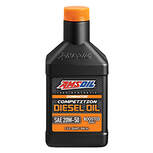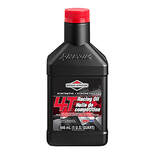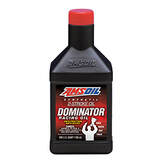|
Buy AMSOIL synthetic motor oil for racing engines at the lowest prices in Canada
Shop for AMSOIL DOMINATOR, Briggs & Stratton 4T racing oils and more |
|
AMSOIL SYNTHETIC RACING OIL FAQ
Q: What’s the difference between racing oil and regular oil?
A: Racing oil is designed specifically for the increased demands of racing engines. The type and amount of additives in its formulation are tailored to provide additional protection against wear and extreme heat common to racing engines. Boosting additive content in these areas doesn’t leave room in the formulation for sufficient levels of additives that passenger-car/light-truck motor oil requires, such as friction modifiers to improve fuel economy or corrosion inhibitors to fight corrosion throughout longer drain intervals. While racing oil is designed to excel in extreme conditions over a relatively short drain interval, passenger-car/light-truck motor oil must excel in multiple areas throughout longer drain intervals.
Q: Why do racing engines need specialty oil?
A: The powerful, modified engines in racing vehicles produce extreme heat and pressures that greatly exceed those of the average car or truck engine. A 900-horsepower Pro 4x4 racing truck, for example, produces oil temperatures in excess of 300°F (149°C). By comparison, the engine in a typical car or truck might hit 230°F (110°C). Extreme heat from racing causes motor oil to break down sooner. In fact, the rate of oxidation doubles for every 18°F (10°C) increase in oil temperature. Racing engines also produce tremendous pressures between components, such as the crankshaft journals and bearings, that can shear the oil’s molecules, reducing its viscosity. For these reasons, racing vehicles require specialty racing oil, in addition to gear oil and racing transmission fluid. Racing engines also require properly formulated assembly lube and break-in oil to achieve maximum power and life.
Q: Can I use racing motor oil in my car?
A: Most competitors change oil every couple races, and sometimes after every race. For that reason, racing motor oil is typically formulated with a lower total base number (TBN), which is a measure of its ability to neutralize acids. Motor oils for passenger cars/light trucks require a higher TBN since they’re changed much less frequently.
In addition, the motor oil you use in your daily driver should excel in other areas unimportant to racers, such as maximizing fuel economy and providing easier cold starts. For these reasons, it’s best to use a motor oil formulated specifically for your vehicle and not a racing oil. Find AMSOIL product recommendations for your vehicle here.
A: Racing oil is designed specifically for the increased demands of racing engines. The type and amount of additives in its formulation are tailored to provide additional protection against wear and extreme heat common to racing engines. Boosting additive content in these areas doesn’t leave room in the formulation for sufficient levels of additives that passenger-car/light-truck motor oil requires, such as friction modifiers to improve fuel economy or corrosion inhibitors to fight corrosion throughout longer drain intervals. While racing oil is designed to excel in extreme conditions over a relatively short drain interval, passenger-car/light-truck motor oil must excel in multiple areas throughout longer drain intervals.
Q: Why do racing engines need specialty oil?
A: The powerful, modified engines in racing vehicles produce extreme heat and pressures that greatly exceed those of the average car or truck engine. A 900-horsepower Pro 4x4 racing truck, for example, produces oil temperatures in excess of 300°F (149°C). By comparison, the engine in a typical car or truck might hit 230°F (110°C). Extreme heat from racing causes motor oil to break down sooner. In fact, the rate of oxidation doubles for every 18°F (10°C) increase in oil temperature. Racing engines also produce tremendous pressures between components, such as the crankshaft journals and bearings, that can shear the oil’s molecules, reducing its viscosity. For these reasons, racing vehicles require specialty racing oil, in addition to gear oil and racing transmission fluid. Racing engines also require properly formulated assembly lube and break-in oil to achieve maximum power and life.
Q: Can I use racing motor oil in my car?
A: Most competitors change oil every couple races, and sometimes after every race. For that reason, racing motor oil is typically formulated with a lower total base number (TBN), which is a measure of its ability to neutralize acids. Motor oils for passenger cars/light trucks require a higher TBN since they’re changed much less frequently.
In addition, the motor oil you use in your daily driver should excel in other areas unimportant to racers, such as maximizing fuel economy and providing easier cold starts. For these reasons, it’s best to use a motor oil formulated specifically for your vehicle and not a racing oil. Find AMSOIL product recommendations for your vehicle here.
















